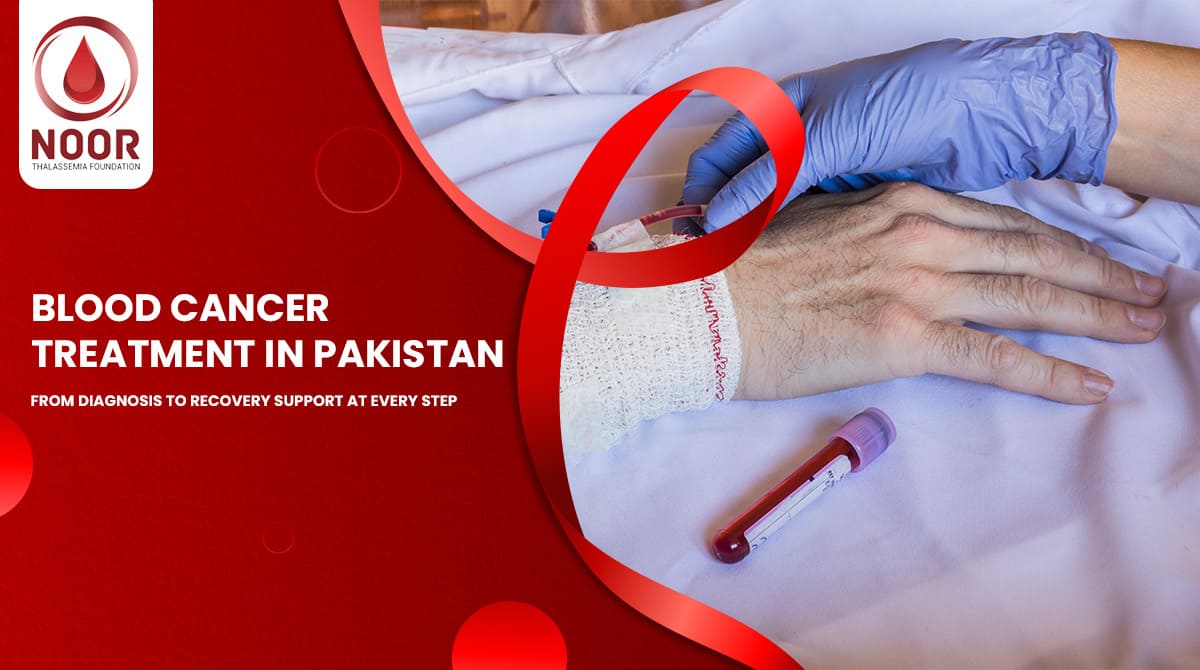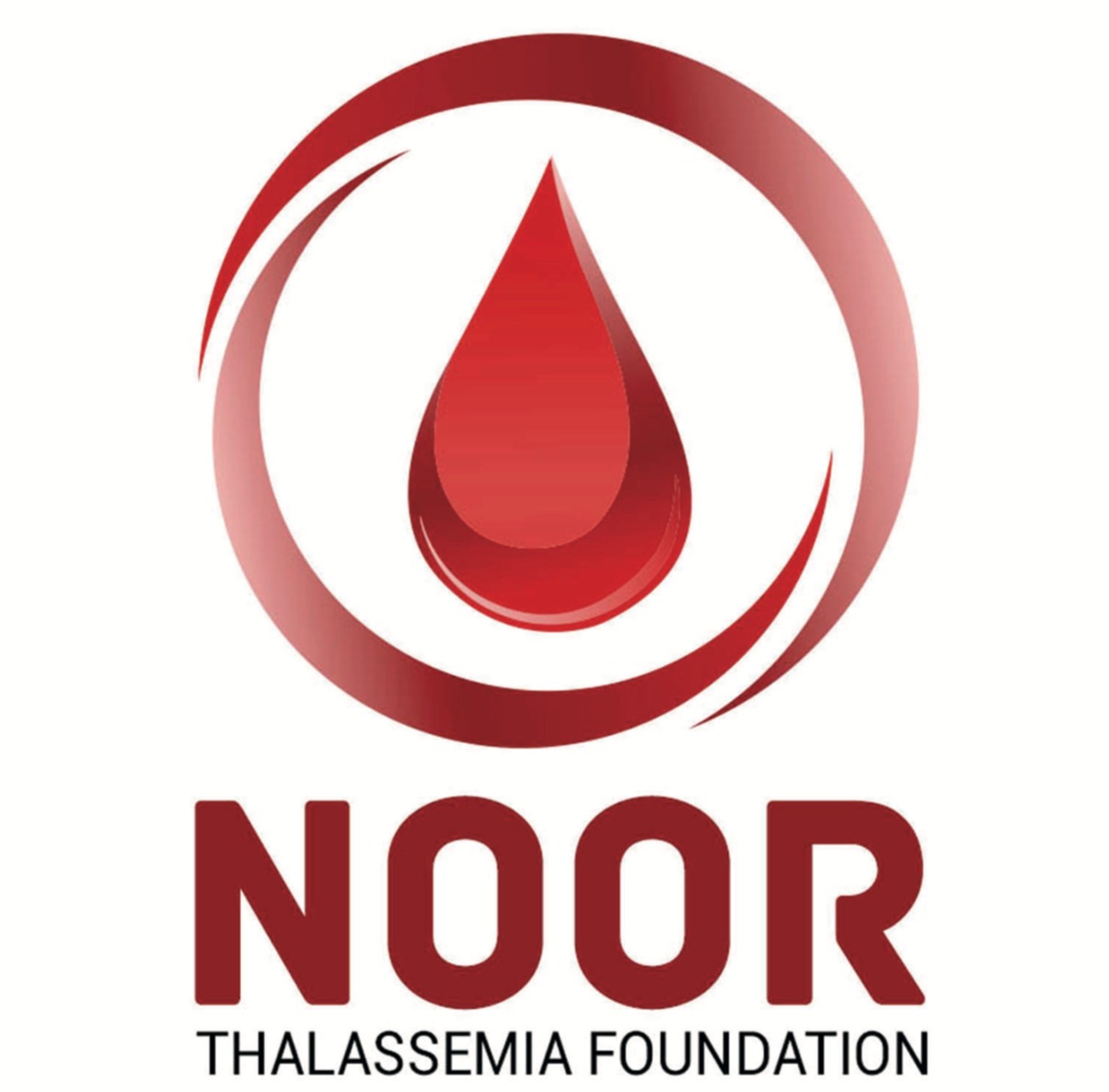Blood Cancer Treatment in Pakistan
21-Jul-2025

Discover the symptoms and diagnosis of blood cancer with in-depth information. Get free treatment options in Pakistan with 100% care provided by Noor Thalassemia Foundation.
Blood cancer is a diagnosis that changes people's lives and affects millions of people around the world. Leukemia, lymphoma, and myeloma are some of the cancers that affect the blood, bone marrow, and lymphatic system. This article will talk about the signs and symptoms of blood cancer, the treatments that are available, and answer some common questions about how to find cancer through blood tests. We will also talk about how the Noor Thalassemia Foundation helps blood cancer patients in Pakistan and how important it is to treat them
What is Blood Cancer?
Blood cancer is a type of cancer that starts in the cells that make blood, like the bone marrow, or in the cells of the immune system. There are a few main types of blood cancer:
1. Leukemia is a type of cancer that starts in the white blood cells and affects the blood and bone marrow.
2. Lymphoma is a type of cancer that starts in the lymphatic system and spreads to lymph nodes.
3. Myeloma is cancer that affects the plasma cells in the bone marrow.
Blood Cancer Symptoms
It's important to know the symptoms of blood cancer so that it can be diagnosed and treated early. Blood cancer can show up in different ways, but some common signs are:
• Anemia: This makes you tired, weak, and dizzy.
• Fever: A fever that comes and goes or that you can't explain.
• Weight Loss: Losing weight for no reason, even though your diet and activity levels haven't changed.
• Pain in the bones: This pain often happens in the chest, back, and joints.
• Changes in skin color or paleness: This is because there are fewer red blood cells.
• Swelling: The lymph nodes, spleen, or liver may swell.
• Bleeding or bruising: Bleeding or bruising that doesn't have a clear cause could mean a low platelet count.
These symptoms can often be confused with other health problems, which makes it hard to find out what's wrong early on. If any of these symptoms last for more than a few days, you should see a doctor right away.
Get Free Blood Cancer Treatment in Pakistan
Over the years, treatments for blood cancer in Pakistan have improved a lot. There are a number of ways to treat blood cancers, but the availability of treatment may depend on where you live and the healthcare system there. The Noor Thalassemia Foundation (NoorTF) is an important group in Pakistan that helps people with blood cancers like thalassemia, hemophilia, and leukemia get free treatment. Noor Thalassemia Foundation makes sure that people who need it get life-saving care, no matter how much money they have.
Most Common Blood Cancer Treatments in Pakistan are:
1. Chemotherapy: A common treatment that uses drugs to kill cancer cells.
2. Radiation Therapy: This treatment uses high-energy radiation to kill cancer cells.
3. Bone marrow or stem cell transplant: This is a treatment for leukemia and other blood cancers that involves replacing sick bone marrow or stem cells with healthy ones.
4. Immunotherapy: This is a new treatment that boosts the immune system to help fight cancer.
5. Targeted Therapy: Focuses on certain molecules that help cancer cells grow and stay alive.
The Noor Thalassemia Foundation also helps people with blood cancers for free. NoorTF is dedicated to making many patients' lives better by providing treatment, counseling, and financial help.
CRP Blood Test and Cancer Detection
People often use a CRP (C-Reactive Protein) blood test to find out how much inflammation is in their bodies. People often use it to find infections, inflammatory diseases, and some kinds of cancer. The CRP test can't tell you for sure if you have cancer, but high levels of CRP can sometimes mean you have cancer or another illness, like an infection or an autoimmune disease.
An elevated CRP level may be one of the signs that doctors look for when diagnosing or keeping track of the progress of cancer treatment in patients with blood cancer. But a CRP test by itself is not enough to tell if someone has blood cancer.
Can Cancer be Detected in Blood Work
This is one of the most common questions patients ask. The short answer is that blood tests can sometimes find cancer, but not always. Routine blood tests, like a complete blood count (CBC), can find problems like low red blood cell or platelet counts, which could mean that you have blood cancer.
But to be sure of the diagnosis, more specific tests like a biopsy, imaging studies, or a bone marrow examination are usually needed. A CBC test is a common blood test that can help find problems like anemia or infections, but it can't tell for sure if you have cancer.
Will Cancer Show Up in Routine Blood Tests
Blood counts that are not normal may make doctors think about leukemia or lymphoma, which could lead to more tests. A CBC, for instance, can find low hemoglobin levels, low platelet counts, or strange white blood cell counts, which are common in blood cancers. But it's important to remember that these results could also mean something else is wrong with your health, so you need to get a more thorough diagnosis.
Does a Full Blood Count Detect Cancer
A Full Blood Count (FBC) is a common blood test that counts the number of red blood cells, white blood cells, and platelets in the blood. It can give you important information about your general health and find conditions like anemia or infections, but it can't tell you for sure if you have cancer. But the test can be a very important first step in finding problems that could mean you have blood cancer.
If you have leukemia or lymphoma, a full blood count may show that your white blood cell levels are too high or too low, or it may show other signs that need to be looked into further, like a bone marrow biopsy or imaging tests.
Bone Profile Blood Test and Cancer Detection
The main purpose of a bone profile blood test is to check the health of bones by looking at the levels of calcium, phosphate, and alkaline phosphatase. This test isn't meant to find cancer, but if the bone profile results are abnormal, they could mean that you have a condition related to cancer, like multiple myeloma or metastatic cancer that affects the bones.
For people with blood cancer, especially multiple myeloma, high alkaline phosphatase levels and changes in calcium levels can be signs that cancer has damaged their bones.
Polymyalgia and Blood Cancer
Polymyalgia is a disease that causes pain and stiffness in the neck, shoulders, and hips. It is not directly linked to blood cancer, but it is important to tell the two apart. Some of the signs of polymyalgia, like pain and tiredness, can be the same as those of blood cancer. Polymyalgia, on the other hand, usually doesn't cause the big changes in blood counts that are common in blood cancers.
It's important to see a doctor if you have symptoms like constant pain or tiredness to find out what's causing them.
Blood Therapy for Cancer
Blood therapy for cancer uses a number of different treatments to make the blood cells and immune system stronger so they can fight cancer. This includes blood transfusions, stem cell transplants, and immunotherapies that help the body find and kill cancer cells.
Blood therapy is often a necessary part of treatment for people with blood cancer. Stem cell or bone marrow transplants, for instance, can help people whose bone marrow has been damaged by leukemia or other blood cancers make new, healthy blood cells.
Conclusion
Blood cancer is a very serious disease that can kill you, but with the right treatment and early detection, many people can live full lives. Routine blood tests can sometimes help find blood cancers, but they don't always give a clear answer. For a clear diagnosis, specialized tests like biopsies and imaging are very important.
The Noor Thalassemia Foundation is very important because it helps people in Pakistan get free blood cancer treatment, which helps those in need who can't afford it. NoorTF makes sure that life-saving treatments get to the people who need them the most by getting donations, zakat, and sadqah. If you or someone you know has blood cancer, get medical help right away. You might also want to help organizations like NoorTF that help other people in need.
Frequently Asked Questions
What are the main types of blood cancer?
There are three primary types of blood cancer:
- Leukemia – Affects the blood and bone marrow, mainly the white blood cells.
- Lymphoma – Targets the lymphatic system, especially lymph nodes and immune cells.
- Myeloma (Multiple Myeloma) – Affects plasma cells in the bone marrow.
Each type has subtypes and different treatment protocols. Accurate diagnosis is essential for effective treatment, and NoorTF offers free diagnosis and treatment services for all these types
What causes blood cancer?
The exact cause of blood cancer is not always known, but the following factors may increase risk:
- Genetic mutations and family history
- Radiation or chemical exposure
- Smoking and lifestyle habits
- Weak immune system or previous cancer treatments
- Certain viral infections (e.g., HIV, EBV)
Environmental and genetic factors play a combined role. Regular screening and early symptoms monitoring are key to reducing the risk
What is a blood cancer report?
A blood cancer report includes results from various tests such as:
- Complete Blood Count (CBC)
- Bone marrow biopsy
- CRP and other inflammation markers
- Flow cytometry and genetic testing
These reports help doctors diagnose the exact type of blood cancer and determine the stage and treatment plan. NoorTF works with expert hematologists to interpret reports and begin free patient care without delay
What are the stages of blood cancer?
Blood cancer stages help determine how far the disease has progressed:
- Stage 1: Early-stage cancer, often limited to blood or marrow
- Stage 2: Cancer may spread to nearby lymph nodes
- Stage 3: Widespread involvement of blood, bone, and immune system
- Stage 4: Advanced spread to multiple organs or body systems
Early-stage cancers are often easier to treat. Noor Thalassemia Foundation ensures early intervention and stage-based personalized treatment
What is the survival rate for blood cancer?
Survival rates vary depending on the type and stage of cancer:
- Leukemia: 40–90% depending on the subtype and age
- Lymphoma: 70–90% with modern treatments
- Myeloma: 50–60%, though improving with new therapies
Early diagnosis and access to affordable treatment greatly improve survival chances. NoorTF helps patients fight blood cancer by offering free treatments funded by your Zakat and donations.
 +042 111 666 783
+042 111 666 783